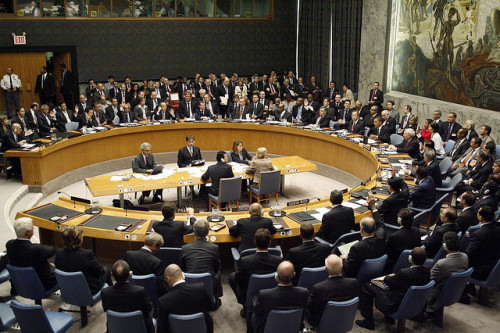Climate change & its impacts, rippling out across all our futures, 2
Friday, August 30th, 2019[ by Charles Cameron — part 1 was Climate change & its impacts, rippling out across all our futures, 1, and dealt with the impact of climate change on the Hajj and other pilgrimage sites ]
.
Climate change, of course, has ripples in many other areas of geo-political, national security and intelligence interest besides Islam, Mecca, and the Hajj.
I’m by no means the first person to foresee what’s now called climate migration — nor that it will involve massive migrations across national borders as well as within sovereign nations.
So that’s another version of the issue variously addressed in a recent NYT op-ed, a New York Intelligencer piece, and a Franklin Foer piece in The Atlantic — the impact of climate change on the nation-state system:
**
Quinta Jurecic, Who Owns the Amazon?
Quinta Jurecic is the managing editor of the highly regarded Lawfare blog, and the subtitle of his piece reads:
The raging fires are straining the usefulness of the concept of sovereignty.
That’s quite a whammy, coming from an impeccable — ha, unimpeachable — source: sovereignty, the self-determination of the nation state, comes into question, and thus the nation state itself. Because fires in the Amazon rain-forest aka the lungs of our planet are too dangerous to be left to the actions of autonomous nations — and the same goes for climate change more generally:
The Amazon fires are a test case of sorts for how the climate crisis will strain the usefulness of seemingly simple concepts — like national sovereignty. Before calling up the military, Mr. Bolsonaro accused countries donating money to preserve the rain-forest of wanting to “interfere with our sovereignty.” He also declared that the international condemnation he faced spoke to a “colonialist mentality,” criticizing what he saw as Mr. Macron’s encouragement for the G7, which does not include Brazil, to grapple with the problem on its own.
Question: what happens to national sovereignty when global interest supervenes?
David Wallace-Wells, The Glimmer of a Climate New World Order
Wallace-Wells is the author of The Uninhabitable Earth: Life After Warming. That may be a book I shall have to review. In this article, however, he makes a point about our academic and technical readiness for climate change, which I’d see as expanding on Jurecic‘s point about sovereignty:
If climate change does transform life on this planet at anything like the scale and speed scientists promise it will, our politics will change with it — and probably quite dramatically. One question this raises is: In what ways? Another is: Will we like what warming does to us? The answers to both are very much open, and we’ve barely begun to develop a political science around climate change that might help us think through the possibilities.
we’ve barely begun to develop a political science around climate change. Not as political science theory, but as diplomatic reality, required to avoid politics turning into warfare — in a nuclear-tipped age.
Question: What might a planetary political science adequate to climate change look like?
Franklin Foer, The Amazon Fires Are More Dangerous Than WMDs
Franklin Foer‘s piece in the Atlantic is subtitled:
One person shouldn’t have the power to set policies that doom the rest of humanity’s shot at mitigating rising
Man, nation, planet — Planet, nation, man?
Arguably, a nation has the right to impose its rule or rules on a man, and analogously, a planet has the right to impose its rule or rules on a nation — but note that the planet’s rules are none other than the laws of nature, so we’ve shifted register from what is humanly imposed tpo what is imposed on humans. And if humans try to emulate those laws, via the UN, or the International Criminal Court in The Hague, some nations may not be exactly happy..
Question: when planetary needs collide with national interfests, rich or poor, who wins, and who needs to win?
**
Okay, those are the three main pieces I wanted to draw your attention to. These are also of possible interest:
Laura Parker, 143 Million People May Soon Become Climate Migrants
Climate change will transform more than 143 million people into “climate migrants” escaping crop failure, water scarcity, and sea-level rise, a new World Bank report concludes. Most of this population shift will take place in Sub-Saharan Africa, South Asia, and Latin America—three “hot spots” that represent 55 percent of the developing world’s populations.
This worst-case scenario is part of a ground-breaking study focused on the impacts of slow-onset climate, as opposed to more visibly dramatic events such as extreme storms and flooding.
Sujatha Byravan & Sudhir Chella Rajan, Before the Flood
Conservative climate and hydrological models suggest that the average sea level will rise by about a foot by 2050, regardless of what new actions we take to reduce greenhouse gases. In some cases, entire nations will disappear; a harbinger of this is Tuvalu in the Pacific, whose government has asked Australia and New Zealand to accept its citizens as the sea swallows their island.
Brian Kahn, How Climate Change Is Becoming a Deadly Part of White Nationalism
Patrick Crusius, the 21-year-old suspect police took into custody after the shooting, is believed to have uploaded a four-page white nationalist document to the message board 8chan … outlining his motives for killing at least 22 people at Walmart on Saturday. Included among its racist, anti-immigrant rhetoric are ideas central to the mainstream environmental movement. “[O]ur lifestyle is destroying the environment of our country. The decimation of the environment is creating a massive burden for future generations. Corporations are heading the destruction of our environment by shamelessly overharvesting resources,” it reads.
**
Is that last quote surprising?
It is if, and only if, one’s basic assumption is of the left / right divide, with the left being ecologically conscious and the right (see Trump) being blind to, and thus potentially blindsided by, climate change. If your significant divisor, on the other hand, is extremist / moderate, then it’s not so surprising after all.





